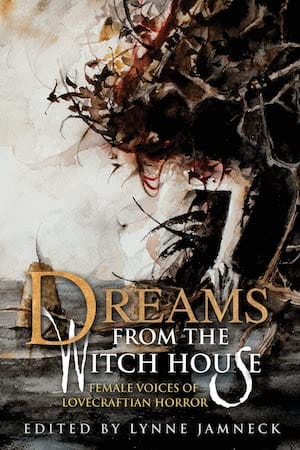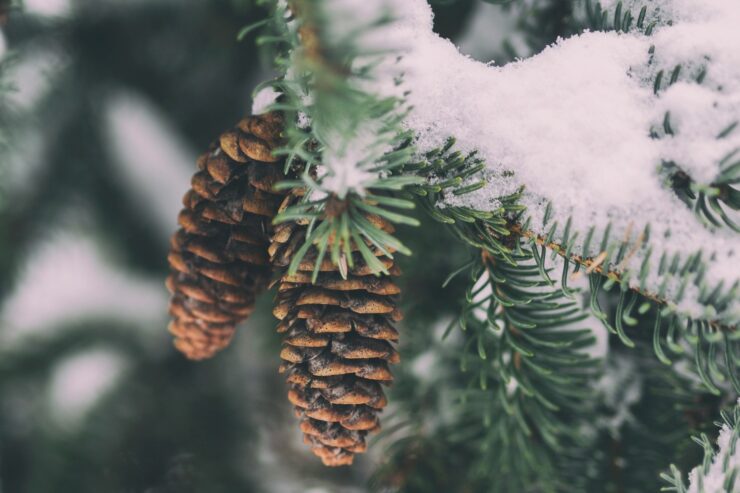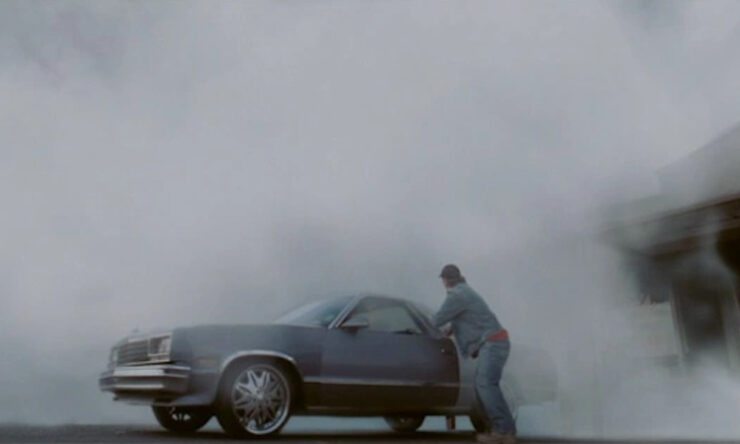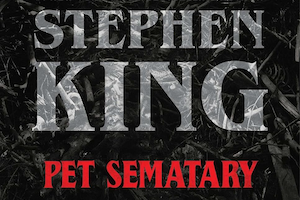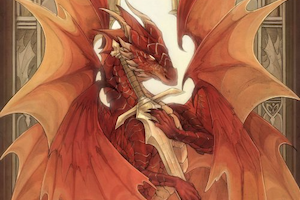Welcome back to Reading the Weird, in which we get girl cooties all over weird fiction, cosmic horror, and Lovecraftiana—from its historical roots through its most recent branches.
This week, we cover Karen Heuler’s “All Gods Great and Small,” first published in Lynne Jamneck’s Dreams From the Witch House in 2015. Spoilers ahead! CW: oodles of insects.
“When the rains ceased, he would tear down, burn down everything that grew.”
John Bream, having failed in all his endeavors up north, has moved farther and farther south, to land at last in Ecuador, “where bribes were cheap and land plentiful.” Here he plans to raise crops or cattle, but first he’ll have to remove the unprofitable “trees and vines and ants and natives” standing in the way of order, cleanliness, open prospects, civilization. The natives should be grateful. Instead they stare silently at him, even the women. “Nothing was in its rightful place here,” particularly not the ants. They swarm everywhere, even in his house and bed, and they bite and sting no matter how many bowls of dead insects his servants present to prove they’re obeying his extermination orders.
His one confidant is McClellan, the only other white man around. Not that McClellan would have been Bream’s choice. He accepts everything with equanimity, even the ants, and he’s learned the local dialect so he can study the natives’ culture. He responds to Bream’s reasonable complaints about divine ill will with non sequiturs like “What is the size of a god?” Of course gods are big, Bream says, or no one would care about them. McClellan muses that gods might be small, because then “aren’t we more at risk of underestimating them?” The locals are rumored to practice an old religion involving insects, and why not insects: omnipresent, ancient, tenacious as they are?
Bream has burned acres of trees around his house and will burn many acres more along his riverside properties. The rainy season sets in, but with the aid of kerosene, he keeps burning. So what if the kerosene gets into the rivers? The damn rivers have flooded Bream’s homestead. Even though his house is raised on stilts, it’s grown so damp that its wood sprouts vines and roots, his dishes grow algae, his rugs rot, and the ants have taken up permanent residence. McClellan shrugs off these travesties of the natural order. The natural order, he observes, is that measured ounce for ounce, ants surpass mankind by a factor of ten. Easy for McClellan to say: The ants never seem to attack him.
One day an Indian canoes to Bream’s house hawking fresh meat. Bream spots what looks like gold among his wares, but the Indian pretends not to understand his questions. As he paddles off, Bream fires a warning shot that “accidentally” wounds the Indian.
Another day Bream and McClellan hire a native to canoe them to the nearest town, where Bream buys every can of pesticide the shabby stores offer. By the river is a rain-drenched outdoor market, or two markets as McClellan explains: one for “town” natives, one for “jungle” natives. The vendors eye Bream suspiciously; McClellan points out that native workers have disappeared since Bream’s arrival, and fish have grown strange—they think he’s poisoning the water. Bream scoffs.
In the “jungle” market, they examine the offerings of “a half-naked old crone” wearing a thick black armband. A stinking orchid clutches her rickety table with white roots like claws, presiding over an assortment of botanicals, bones, and sorcerous-looking leaf packets. She mutters at the insecticide he holds, hisses when he crushes an ant and flicks it—unintentionally, of course—at her. McClellan translates: She says Bream has killed her daughter, by which she means the ant: The natives believe all creatures of nature are their daughters, with rights and even intelligence.
Buy the Book
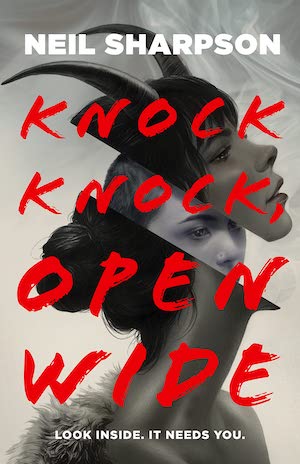

Knock Knock Open Wide
Rain pours, further annoying Bream. If it weren’t for the other Indians, he’d smash the crone’s wretched wares. Still, needing to show his disdain and authority, he says he’ll buy all her things and sweeps them into his bag before McClellan can translate her reply. She angrily refuses Bream’s money. McClellan explains that money isn’t the right offering, and that he’s insulted her. When Bream throws his bag and her wares into the river, she shouts unintelligible threats. Her black armband disintegrates into scurrying ants that leap toward Bream. He sprays them with insecticide, causing the whole market to erupt in outraged wails. McClellan pulls Bream away. Bream’s crossed a shaman. Whatever he believes about the local religion doesn’t matter. The locals believe in it, and will act as if it’s true.
They canoe to one of Bream’s riverside acquisitions where his workers are kerosene-torching the trees. Bream spots the market “priestess” rallying workers around her termite-mound perch. They drop their gear and leave. The old woman vanishes. McClellan, uncharacteristically anxious, persuades Bream to return home. The priestess has “influence, power.” Something’s going to happen, doesn’t Bream feel it?
Back home, Breams orders the servants to spray pesticide everywhere, then go into the jungle and kill all the ants they can find. Meanwhile he gets drunk.
In the morning he wakes to a fierce headache and an acrid odor. In his hung-over condition, the wall seems to shimmer. Then it wavers and slides to the floor, “a great moving blanket of horror, heading for him,” composed of millions of ants. He screams for McClellan, not because McClellan is there, but because he’s the only other representative of a sane world. Ants in orderly rows bite into his flesh. The priestess enters, more ants flooding in behind her. “Go, my daughters,” she says, in English.
As she repeats the command, Bream hears “shrill insect cries now, at his ears, at his mouth, the tiniest shouts of joy, the savage grinding of their ceaseless jaws.”
What’s Cyclopean: Bream’s ant bites don’t just itch, they suppurate.
The Degenerate Dutch: Bream, forced south by his failures, finds “trees and vines and ants and natives” all equal impediments to his land’s profitability, and is desperate for the company of another white man, even if he’s maybe “a fanatic”.
Weirdbuilding: Insectile power may stem from their deep time origins: they’re older than humanity, older than dinosaurs. Imagine how much they’ve learned, in all that time.
Anne’s Commentary
According to AntWiki, Ecuador hosts 96 genera and 743 species of ants. Bream is less nice, classifying the ants of his acquaintance by color: red, black, brown, parti-colored, who even the hell cares? Every last bastard swarms, bites, stings, and deserves instant eradication, same as all the trees, vines and natives impeding his march toward profit and civilization. He’s a literary cousin to the protagonist of Carl Stephenson’s famous story, “Leiningen Versus the Ants” (1938). Think Charlton Heston, who starred as Leiningen in the 1954 film adaptation, The Naked Jungle. Except I imagine Bream more as a Heston wannabe: less indomitable in the jawline, less alpha-male overall, and so the more determined to bluster his way to control of every situation. The people back north may label him a failure, but by all the gods, these half-tame “town natives” and outright jungle savages are going to acknowledge him as their master! Despite the fact they’ve survived in Ecuador for centuries before his arrival, the poor bastards would starve without him. That’s a fact not even know-it-all McClellan can dispute, can he?
Or else McClellan’s learned there’s no use arguing with Bream.
Let’s return to the sanity of myrmecology. Though most species of ants can bite and/or sting, few are dangerous to humans. Ecuador has various fire ants and the notorious bullet ant, as well as army ants. Entomologist Frank Nischk tells a story with which Bream could identify in his book Of Crickets and Cockroaches. Nischk was alone in an Ecuadorian research station, a structure raised on posts like Bream’s house, when he heard the distinctive rustle of an army ant column on the march. Nischk wasn’t alarmed for himself, knowing these particular invaders weren’t equipped to slice up large mammals, but his laboriously collected insect specimens and the station’s provisions were in dire peril! He grabbed a broom and heroically swept out wave after wave of invaders until the army decided to move on to less vigorously defended prey.
I guess Bream didn’t have a broom, or didn’t bother to know where the servants kept their housekeeping equipment. Alternatively, he could just have run. Of the sub-Saharan driver ants, Hoelldobler and Wilson write:
“Yet driver ants are not really the terror of the jungle as popularly conceived. Although the colony is an “animal” weighing in excess of 20 kilograms and possessing on the order of 20 million mouths, its raiders move over the ground at the rate of only a meter every three minutes. It is possible to watch the whole process at close range while seated comfortably in a camp chair (which of course must be periodically moved–carefully, and in the right direction!).”
But let’s not reckon solely on the capabilities of real-world non-magical ants. Even Bream’s everyday tormentors seem to have it out for him in particular. He’s been throwing the natural order of the rainforest out of balance from the start. If the rainforest’s one of the “great” gods of Heuler’s title, it may be firing warning shots at Bream in the form of myrmecoid “paintballs.” Bream grudgingly (and only to himself) admits that McClellan could be right about the existence of “small” gods, and that the ants could be a “nasty” sort conjured by the “staring natives” to “rid themselves of men like him.”
This is, for Bream, a stellar insight, both that the natives want to get rid of him and that there are conjurors among them. He will meet one in the “old crone”, and he will push her (a representative of the forest-god) too far. I wonder if McClellan has also become a representative of the forest, this odd white man with no predatory interests. Certainly he represents the Good White Man.
Whereas Bream is quintessentially the Bad White Man, racist and exploiter and walking environmental disaster. I once read a magazine publisher’s list of storylines that would doom a submission to immediate rejection. The Number One pariah might have been “And in the end, it was all a dream,” but not far behind was the “And in the end, the absolutely irredeemable character gets eaten by the monster, yay.” One variation of which was “And in the end, the poor dumb slob gets eaten by the monster, oh well.” Bream qualifies as both absolutely irredeemable and a dumb slob, but does Heuler’s story merit immediate rejection? Its publisher obviously didn’t think so, nor, I expect, would many others. Which shows the limitations of lists that limit acceptable tropes.
I find “All the Gods” a little too unnuanced, but I do get and appreciate one of the goals Heuler mentions in her Author’s Note on the story. She writes that it’s most immediately inspired by Lovecraft’s “Rats in the Walls.” The “restless motion” and “harrowing sense of hidden horror” of “Rats” is superbly translated into the overly lush and lively rainforest of “All the Gods,” and ye gods, all “those biting little insect teeth”!
I hate bug bites and stings. I think I’d rather deal with ghost rats, thank you.
Ruthanna’s Commentary
The Manhattan Transfer’s “The Jungle Pioneer” is a perkily disturbing song about Amazonian deforestation. It might be the anthem for Bream, a self-exiled incompetent asshole who only wishes himself an “uncreator” of “god’s mistake”. Lawns are fundamentally a demonstration of colonial power, the ability to exert one’s will over the local ecology—nearly as absurd in, say, the American southwest, as floating mid-rainforest. But Bream wants “prospects” in all senses of the word, wants to turn the place he’s ended up into another place entirely: one with different plants, animals, and people.
Especially animals.
It’s a cliché to describe human insignificance to vast incomprehensible entities™ by saying that we’re “like ants” to them. As this story illustrates, the human-ant relationship is not always straightforward. Bream wants to destroy his small irritants with scarcely a thought, and receive gratitude and worship in return. But if you put all the world’s ants on one side of a scale—quoth McLellan—and all the humans on the other, the ants have us outweighed as well as outnumbered. You can spend all day spraying Raid, and it matters deeply to the specific ants you’ve sprayed and indeed to their environment—but you won’t actually bring about the ant apocalypse.
Most stories where we bite eldritch abominations don’t turn out well for us—you are what you eat and so forth. Someday I’d like to read a story where we really are like ants. Is Dagon deathly allergic to humans? Does the Goat With a Thousand Young worry about us spreading germs in her nursery?
McLellan has useful points to make, and is also one of this story’s saving graces. I tend to get impatient waiting for a jerk to get eaten by a grue, particularly when stuck in the jerk’s head. Bream by himself is a hubristic bigot who I could happily watch get masticated after a paragraph. I suspect the Ecuadorans unfortunate enough to live on or near “his” land feel the same way. (And indeed, they eventually help make it happen.) McLellan, though, provides an intriguing intermediary ground. Bream’s an all-too-familiar sort, but what is this guy doing?
McLellan understands the locals, at least a little. He understands that they’re people, for a start, with points of view that aren’t shaped by the convenience of colonists. I’m not sure he cares, though. After all, he’s hanging out with Bream, and seems to find him amusing. I suspect he finds everything amusing—one of those people who appreciate the rest of the world largely as a source of entertainment, and who consider themselves observers. A researcher, appropriately and safely detached from the events at hand. His hubris is subtler than Bream’s, but perhaps ultimately just as deadly. I imagine the look on his face, as he suddenly realizes that standing next to the man throwing shit is… maybe not a much better life choice than doing the actual throwing.
Does he, in fact, know much about the local insect religion? Or is he dabbling just enough to speculate? If he were really devoted to his research, why would he do more than have an occasional drink with Bream? Though it’s possible that translating for jerks pays better than amateur anthropology. He may be in search of a new source of funding—well, after the end of the story he certainly is, assuming he survives.
In addition to being an insectile religion, it’s also a matriarchal one. Or a filiarchal one—the ants are “daughters,” after all, as are other natural entities. Perhaps the shaman is a mother-protector to the creatures that protect her and hers. Perhaps the ants look to humans as parental, symbiotic deities, as cultists look to elder gods who’re capable of both extraordinary destruction and extraordinary boons.
Bream is, really, beside the point—trivial in the story’s grand scheme. He’s there merely to set off the central question. What does it really mean for something vast and incomprehensible to interact with something miniscule and incomprehensible—and can you really tell which of those scales has the greater power?
Next week, the arguments—and the fights with faceless cowboys—continue in Chapters 11-12 of Max Gladstone’s Last Exit.
Ruthanna Emrys is the author of A Half-Built Garden and the Innsmouth Legacy series, including Winter Tide and Deep Roots. You can find some of her fiction, weird and otherwise, on Tor.com, most recently “The Word of Flesh and Soul.” Ruthanna is online on Twitter and Patreon and on Mastodon as [email protected], and offline in a mysterious manor house with her large, chaotic household—mostly mammalian—outside Washington DC.
Anne M. Pillsworth’s short story “The Madonna of the Abattoir” appears on Tor.com. Her young adult Mythos novel, Summoned, is available from Tor Teen along with sequel Fathomless. She lives in Edgewood, a Victorian trolley car suburb of Providence, Rhode Island, uncomfortably near Joseph Curwen’s underground laboratory.










